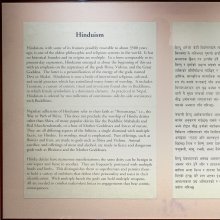Masu: 4 definitions
Introduction:
Masu means something in the history of ancient India, Marathi, biology. If you want to know the exact meaning, history, etymology or English translation of this term then check out the descriptions on this page. Add your comment or reference to a book if you want to contribute to this summary article.
Images (photo gallery)
India history and geography
Source: Cologne Digital Sanskrit Dictionaries: Indian Epigraphical GlossaryMāśu.—(Chamba), one enjoying land, who does not pay rent or tax but renders service; e. g., a carpenter, etc. Note: māśu is defined in the “Indian epigraphical glossary” as it can be found on ancient inscriptions commonly written in Sanskrit, Prakrit or Dravidian languages.

The history of India traces the identification of countries, villages, towns and other regions of India, as well as mythology, zoology, royal dynasties, rulers, tribes, local festivities and traditions and regional languages. Ancient India enjoyed religious freedom and encourages the path of Dharma, a concept common to Buddhism, Hinduism, and Jainism.
Biology (plants and animals)
Source: Google Books: CRC World Dictionary (Regional names)Masu in Uganda is the name of a plant defined with Cissampelos mucronata in various botanical sources. This page contains potential references in Ayurveda, modern medicine, and other folk traditions or local practices It has the synonym Cissampelos pareira var. deglabrescens Welw. ex Hiern (among others).
Example references for further research on medicinal uses or toxicity (see latin names for full list):
· Catalogue of the African Plants collected by Dr. F. Welwitsch in 1853—61 (1853)
· South African Journal of Botany (2008)
· Conspectus Florae Africae (1898)
· Journal of Ethnopharmacology (2005)
· Journal of Ethnopharmacology (1995)
· Kew Bulletin (1937)
If you are looking for specific details regarding Masu, for example side effects, health benefits, extract dosage, chemical composition, diet and recipes, pregnancy safety, have a look at these references.

This sections includes definitions from the five kingdoms of living things: Animals, Plants, Fungi, Protists and Monera. It will include both the official binomial nomenclature (scientific names usually in Latin) as well as regional spellings and variants.
Languages of India and abroad
Marathi-English dictionary
Source: DDSA: The Molesworth Marathi and English Dictionarymasu (मसु).—m Void space preserved along the interior of a wall when building it (to contain grain).
Marathi is an Indo-European language having over 70 million native speakers people in (predominantly) Maharashtra India. Marathi, like many other Indo-Aryan languages, evolved from early forms of Prakrit, which itself is a subset of Sanskrit, one of the most ancient languages of the world.
Kannada-English dictionary
Source: Alar: Kannada-English corpusMāsu (ಮಾಸು):—
1) [verb] to become dull, lusterless; to lose brightness.
2) [verb] to become dirty or filthy; to be polluted.
3) [verb] to make dirty or filthy; to pollute.
4) [verb] to become ceremonially unclean; to be defiled.
5) [verb] to make ceremonially unclean; to defile.
6) [verb] to grow less gradually; to diminish.
--- OR ---
Māsu (ಮಾಸು):—
1) [noun] dirt; filth; unlcean matter.
2) [noun] a dirty cloth, garment.
3) [noun] the organ in most mammals, formed in the lining of the uterus during gestation, connected to the embryo by the umbilical cord, which is discharged following the child-brith; placenta.
4) [noun] (fig.) a blemish; disgrace; dishonour.
--- OR ---
Māsu (ಮಾಸು):—[noun] the soft substance of a human or other animal body, between the skin and the bones, consisting of muscle and fat; the muscular tissue; flesh.
Kannada is a Dravidian language (as opposed to the Indo-European language family) mainly spoken in the southwestern region of India.
See also (Relevant definitions)
Starts with (+52): Macucikam, Macukam, Macukkaram, Macul, Macumaru, Macumata, Macunam, Macuracuram, Macuram, Macuran, Macuri, Macurikai, Macurikam, Macuti, Macuvanki, Mashuka, Mashukana, Mashuki, Mashulabara, Mashuna.
Ends with (+14): Ajamasu, Ayimacu, Bhishmasu, Bhuteko-masu, Brahmasu, Camacu, Daay sawng masu, Damasu, Dammasu, Dharmasu, Dieng lamasu, Dieng-la-masu, Gummasu, Hadamasu, Hummasu, Kamacu, Kamasu, Keshashmashu, Keymasu, Kocumacu.
Full-text (+5): Lukuva-masu, Shara mashu, Daay sawng masu, Masucila, Mash, Dieng-la-masu, Valaivatam, Masurakshita, Pommacu, Macuvanki, Kotimacikal, Pacatu, Macaru, Macilamani, Turucu, Kalimpu, Putapakam, Taiva, Malam, Masati.
Relevant text
Search found 1 books and stories containing Masu, Mashu, Māśu, Māsu; (plurals include: Masus, Mashus, Māśus, Māsus). You can also click to the full overview containing English textual excerpts. Below are direct links for the most relevant articles:
Related products

